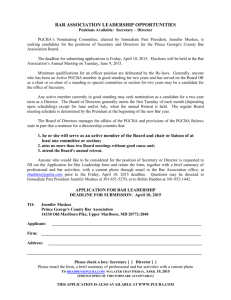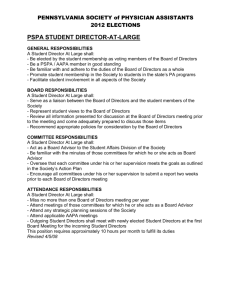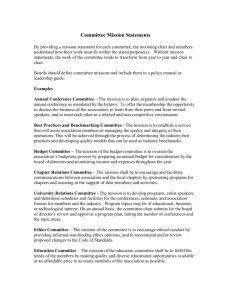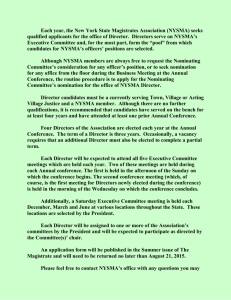Governance Policy - Backus
advertisement
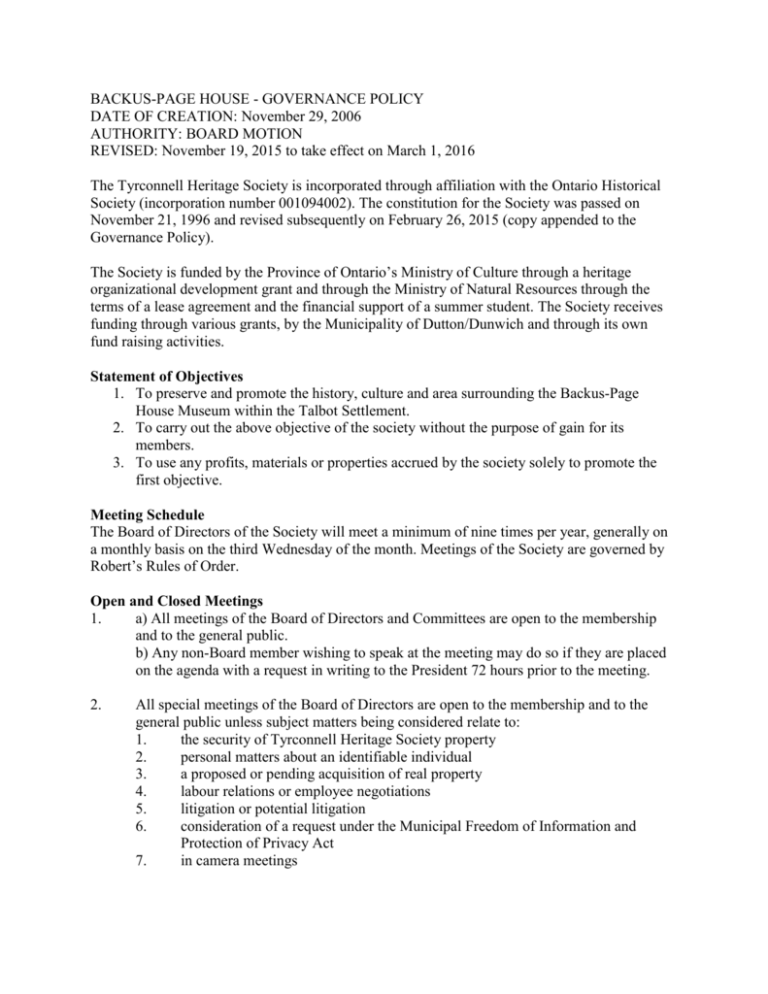
BACKUS-PAGE HOUSE - GOVERNANCE POLICY DATE OF CREATION: November 29, 2006 AUTHORITY: BOARD MOTION REVISED: November 19, 2015 to take effect on March 1, 2016 The Tyrconnell Heritage Society is incorporated through affiliation with the Ontario Historical Society (incorporation number 001094002). The constitution for the Society was passed on November 21, 1996 and revised subsequently on February 26, 2015 (copy appended to the Governance Policy). The Society is funded by the Province of Ontario’s Ministry of Culture through a heritage organizational development grant and through the Ministry of Natural Resources through the terms of a lease agreement and the financial support of a summer student. The Society receives funding through various grants, by the Municipality of Dutton/Dunwich and through its own fund raising activities. Statement of Objectives 1. To preserve and promote the history, culture and area surrounding the Backus-Page House Museum within the Talbot Settlement. 2. To carry out the above objective of the society without the purpose of gain for its members. 3. To use any profits, materials or properties accrued by the society solely to promote the first objective. Meeting Schedule The Board of Directors of the Society will meet a minimum of nine times per year, generally on a monthly basis on the third Wednesday of the month. Meetings of the Society are governed by Robert’s Rules of Order. Open and Closed Meetings 1. a) All meetings of the Board of Directors and Committees are open to the membership and to the general public. b) Any non-Board member wishing to speak at the meeting may do so if they are placed on the agenda with a request in writing to the President 72 hours prior to the meeting. 2. All special meetings of the Board of Directors are open to the membership and to the general public unless subject matters being considered relate to: 1. the security of Tyrconnell Heritage Society property 2. personal matters about an identifiable individual 3. a proposed or pending acquisition of real property 4. labour relations or employee negotiations 5. litigation or potential litigation 6. consideration of a request under the Municipal Freedom of Information and Protection of Privacy Act 7. in camera meetings 3. No recommendation can be considered or a decision made except by the Board of Directors at a regular meeting open to the public. 4. Quorum for meetings of the Board of Directors shall consist of the majority of the Board. Implementation 1. All recommendations made by special meetings or by committees of the Board of Directors shall be made to the Board in writing or orally and be tabled by the committee chair. 2. If a special meeting or committee meeting is closed to the public, the secretary of the Board shall record the holding of a closed meeting. Duties of the Board 1. The President is responsible for chairing all meetings of the Board of Directors and the annual general meeting of the Tyrconnell Heritage Society, including: 1. communicating Board decisions to the Cultural Manager 2. calling emergency or ad-hoc meetings of the Board as required 3. representing the Society in an official capacity during Society functions and in the community at large 2. The Vice President shall perform the duties of the President in the President’s absence. 3. The treasurer is responsible for working with the finance staff to maintain the financial records of the Society and for submitting the required government documents. Grants and Funding 1. All correspondence for grant applications, sponsorship and donation requests and proposals shall use the mailing address of the Tyrconnell Heritage Society. 2. All grant applications will be reported to the Board of Directors. Reports shall include 1. Amount applied for 2. Name of funding source 3. Date applied 4. Society’s contact person 5. Results 3. The President and/or the Cultural Manager shall be the authorized signature on all grant, sponsorship, donation or funding applications, requests, and proposals. Society Correspondence All correspondence for the society or the museum shall use the society’s mailing address. Committee Structure 1. The President and upon informing the President, the Cultural Manager may from time to time form ad-hoc committees, provided that the terms of reference, membership, applicable policies, budgets and committee life-span are clearly set out in the minutes of the Board. 2. Quorum for committee meetings shall be a simple majority of members. Agendas and Minutes 1. All meetings of the board shall follow a written agenda. 2. The secretary shall accurately record, without note or comment, all resolutions, decisions, and other proceedings of the Board of Directors. This record shall be called the Board Minutes. 3. The minutes are to be retained by the secretary on behalf of the Board of Directors, as a permanent record of Society business. 4. Minutes are to be reviewed for accuracy at the next Board meeting and signed by the President and Secretary. 5. The chair of each committee shall name a secretary for the committee, and the secretary shall accurately record, without note or comment, all the resolutions, decisions and other proceedings of the committee, to be forwarded to the Cultural Manager and President as information. Delegation of Powers 1. The Board of Directors may, by motion, delegate to the Cultural Manager, the exercise of such power and authority as it may determine for the proper conduct of Society business. Annual Report 1. An annual report on the previous year’s activities will be delivered at the annual general meeting. 2. The annual financial statement as reviewed by the auditor is presented by the treasurer at the annual general meeting for approval. Distribution of Assets & Liabilities in the Event of Dissolution of the Society The Society’s assets and liabilities may be disposed of as the Society’s Board of Directors recommends at a special or annual meeting. Such recommendation must be approved by a two thirds majority vote of the membership present for such meeting, provided that notice of motion shall have been given at least thirty days in advance in writing. (see obligations regarding Ontario Historical Societies). In the event of dissolution of the society, and after payment of all its debts and liabilities, its remaining property shall be distributed to one or more qualified donees. A definition and list of qualified donees can be found on the Canada Revenue Agency standards. Legislative Requirements The Tyrconnell Heritage Society is responsible for following legislative requirements of municipal, provincial and federal governments and those international agreements ratified by the federal government. The Cultural Manager should advise the Board of Directors of these requirements. Board of Directors Position Description The following position description outlines the responsibilities and tasks of individual Board members and of the Board as a whole. The Board ensures that the purposes for which the Tyrconnell Heritage Society and the Backus-Page House Museum exist are being fulfilled. All Board Members must be a minimum 18 years of age. Responsibilities: 1. A Board member is responsible for being familiar with and respecting the policies, activities and operations of the Tyrconnell Heritage Society. 2. A Board member respects the Society’s Conflict of Interest and Ethical Guidelines Policy and follows the ethical guidelines for conduct. 3. The Board safeguards the Society’s assets, including the collections and their care, on behalf of the community and is accountable to the members of the Society. 4. The Board is responsible for the funds which the Society receives, raises, accepts and disburses. 5. The Board is responsible for the budget and its monitoring, donations and grant monies received and used by the Society. 6. The Board appoints an auditor prior to the annual general meeting who examines and reports on the Society’s financial accounts. 7. Fundraising is an important responsibility of the Board. The purpose of fundraising is to assist the Society in fulfilling its mandate. Board members are expected to participate in fundraising activities as prescribed by the Board and the Cultural Manager through an annual revenue generating plan or by other means. 8. The Board approves the hiring and the evaluations of the Cultural Manager and Bookkeeper. The Board of Directors guides the Cultural Manager. The President of the Society is the official means for communication of Board decisions. 9. The Board and Cultural Manager review on a regular basis the Society’s mission statement, short-term plans, long-term plans, constitution and policies. The Board brings recommendations for constitutional change to the annual general meeting. 10. The Board and Cultural Manager serve as a liaison between the community and the Society. 11. A Board member attends Board of Director meetings and is responsible for any actions and decisions taken by the Board, even if absent from the meeting.


